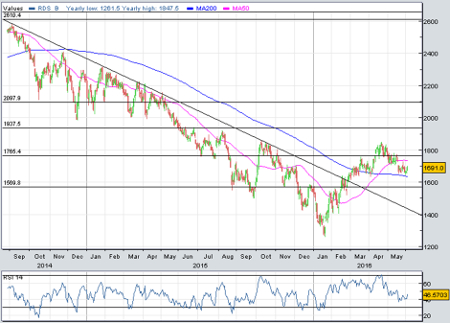How Shell can save its mega-dividend
3rd June 2016 12:56
by Lee Wild from interactive investor
Share on
BG Group shares disappeared from trading screens in February following completion of $55 billion (£38 billion) acquisition of the former British Gas division. Its last set of results as a standalone company were pretty good - it turned a profit of almost $3 billion - and consensus is that the mega-merger is a sensible move for Shell.
We'll get more of an idea next week when Shell publishes its first strategic update since completion of the deal. Admittedly, it's very early days, and the analysts at broker Jefferies reckon the 7 June update will be "long on thematics and short on specifics". Fair enough.
So don't expect guidance on production volumes or cash flow generation - that would be a pleasant surprise, given they haven't done so since mid-2013. This time the outlook is clouded by Shell's ambition to sell $30 billion of assets, write analysts Jason Gammel and Marc Kofler.
"The primary incremental guidance that we believe the company could provide at the strategic update is for capital expenditures beyond 2016. We currently estimate a modest reduction to $28 billion in both 2017 and 2018, which is a 41% reduction from 2014 levels (including BG) and within the range we have seen amongst competitors.
"Incremental spending reductions have lowered the 2017 break-even price to about $60/bbl, assuming no scrip dividends [where shareholders take the dividend in Shell shares rather than cash]."
That could fall to as little as $45 a barrel - among the lowest in the sector - argue the Jefferies pair, if the scrip uptake remains consistent at about 40% into 2017.

Of course, Shell shareholders love the dividend - an estimated $1.88 for 2016 for a prospective yield of over 7.5% - and it could depend heavily on the sale programme. To hit its gearing target of 20% (26% at the end of Q1) Shell must cut net debt by $27 billion by the end of next year, or $22 billion by the end of 2018.
"We estimate there is already line of sight to $6.5 billion of divestiture proceeds from transactions already in the public domain, including $0.8 billion of MLP dropdowns realized in second-half 2015 and an assumed $1.2 billion of value true-up/working capital release from the Motiva dissolution," says Jefferies.
"We have identified another $14 billion of potential proceeds from assets that have lower sensitivity to oil prices."
The broker thinks Shell offers the most attractive valuation amongst the super-majors, "albeit with some risks". It believes Shell trades at a discounted valuation - a forward price/earnings (PE) ratio of 17.3 times is a 30% discount to peers, and 16.4 times for 2017 a 17% discount - because of ongoing uncertainties around the BG purchase. But fears are overdone, it says.
"The BG acquisition should prove transformational and will move the project portfolio down the cost curve. We expect that significant incremental cost savings will be achieved post-merger, and that a successful divestiture process will underpin a $25 billion share repurchase program.
"Our 2,040p price target is primarily derived from a Discounted Cash Flow model, supported by a [sum of the parts] and [dividend discount model] analysis."
This article is for information and discussion purposes only and does not form a recommendation to invest or otherwise. The value of an investment may fall. The investments referred to in this article may not be suitable for all investors, and if in doubt, an investor should seek advice from a qualified investment adviser.